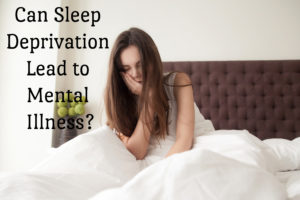By: Lauri Leadley, CCSH, RPSGT- Clinical Sleep Educator|Sleep Coach

Lauri Leadley, Clinical Sleep Educator, President of Valley Sleep Center
How much sleep does a person need? This is one question over which experts remain divided. Some people may need 6-7 hours of sleep while others might need 8-9 hours – different factors can influence the number of hours you require.
As a professional sleep coach my goal is to help people improve their quality of sleep, so they start sleeping better without having to focus on the numbers.
Remember, quality sleep is a key factor for maintaining your mental and physical health.
Related Article – Why Quality Sleep is Fundamental to Good Health
However, the discussion on quality sleep and the number of hours a person should clock also throws up a critical question –
Can sleep deprivation or the lack of sleep lead to mental illness?
The brain functions better when rested
Sleep deprivation can cause a host of problems if it continues over a period. In some people disrupted sleep can cause irritation and a general lack of energy and focus. In others it could lead to radically different behavior like drastic mood swings, cognitive or memory problems, depression, and anxiety.
If left unchecked, it can even lead to paranoia and suicidal tendencies. However, these are extreme cases, and the number of people who display these behavioral changes is very small.
A well-rested brain, on the other hand, is sharp and focused. Nice sleep not only improves the brain’s ability to focus better, it sharpens your decision-making ability and clarity of thought.
A well-rested brain also allows for better consolidation of memories and processing of information – both of which are crucial to our cognitive abilities.

Mental Illness and Sleep Deprivation
In the US, an estimated 50-70 million people have experienced some form of sleep deprivation along with other chronic sleep disorders.
A serious overlap exists between different kinds of sleep disorders (such as insomnia, Obstructive Sleep Apnea (OSA), sleep movement disorders, and narcolepsy) and mental illness. And for this reason, unlinking the two can be problematic.
Depression – Studies show that one in five people who are depressed also suffer from OSA. In a majority of patients, it was found that those patients who are depressed also suffer from insomnia.
Anxiety Disorder – In more than 50% of cases, it was found that patients suffering from generalized anxiety disorder, post-traumatic stress disorder (PTSD), obsessive-compulsive disorders, and panic disorders also suffer from some form of sleep disorder.
Sleep disruptions in patients suffering from PTSD can lead to negative emotional responses which in turn can impact the effectiveness of correctional therapies.
Bipolar Disorder – Studies have found that during a bipolar manic episode 69% to 99% of patients experience insomnia or need less sleep. In bipolar depression, however, 23% to 78% slept excessively; only a small percentage experience either restless sleep or insomnia.
Studies also suggest that right before an episode of mania or depression, sleeping disorders tend to worsen. In several patients, sleep deprivation can trigger an episode of mania and also impact mood swings.
Seek Professional Help for Sleep Disorders and Mental Health Problems
Regardless of whether you suffer from sleep disorders, mental health issues, or a combination of both, there are a few common fundamentals that can help improve your condition. These include the following:
- Lifestyle Changes – to improve your mental and physical health.
- Focusing on Better Sleep Hygiene – to start sleeping better.
- Routine Physical Activity and Relaxation Techniques – physical health is critical to your mental health; a healthy body will respond better to any kind of therapy or medication plan.
- Seeking Professional Help – consult with a professional sleep coach if you suffer from sleep disorders and with a mental health professional for mental health disorders.
If sleep deprivation is an ongoing problem, consult with a professional sleep coach. There’s no reason to delay this important first step!
By addressing the underlying factors of sleep deprivation, you can not only improve upon your quality of sleep but more importantly, prevent sleep deprivation from impacting your physical and mental health long term.
Valley Sleep Center – We Can Help You Sleep Better!
Is poor quality sleep impacting your mental and physical health? If yes, then we at Valley Sleep Center can help you. For a consultation with sleep coach Lauri Leadley, please email us at sleep@valleysleepcenter.com.

